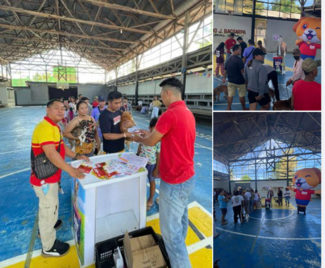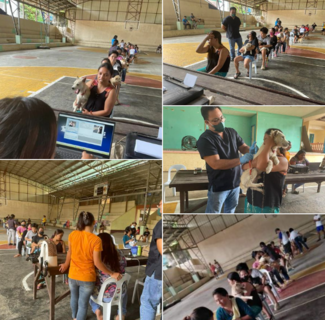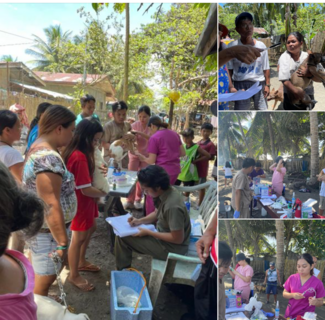
Your Work
Where do you work?
I am the Provincial Coordinator of the Rabies Prevention and Control Program of the Province of Agusan del Norte, Philippines
When did you start your work?
2004
What rabies elimination work do you do?
I am the Provincial Coordinator of the Rabies Program of the Province of Agusan del Norte, Philippines. I am, at the same time, the chairperson of the One Health Approach Rabies Program of the province. In 2016, the province of Agusan del Norte started an initiative to integrate the One Health Approach into its rabies prevention and control program. In the One Health Approach, different offices of the province (veterinary, health, social services, and information system) were linked together for a concerted effort to control and possibly eradicate rabies in the province. Policymakers were also connected for ordinance support. An information system called Rabies Management Information System (RabMIS) was also created to record, store, and maintain a database for the One Health Approach Rabies Prevention and Control Program. For sustainability purposes, our One Health Rabies Program has a sustainability scheme from the payment of printed dog vaccination and Post-Exposure Prophylaxis cards and also from system fee. The fund that we generated were translated into the augmentation of the rabies program workforce (hiring of additional vaccinators in Animal Bite Treatment Centers and student dog vaccinators), procuring medical supplies and equipment, and providing incentives to program implementers. Since 2016, we have an increasing trend of canine rabies vaccination coverage in the province as well as increasing number of animal bite patients given post-exposure prophylaxis treatment. Additional two Animal Bite Treatment Centers were opened in the province in 2022, making it a total of 5 ABTC in the whole province. From 2016 to 2020, the province has a 5 consecutive years of zero human rabies mortality. Our effort was disrupted during the pandemic. Due to hospital restrictions at that time, fewer animal bite patients went to the ABTC. And because of lock downs, fewer dogs were vaccinated during that time. It resulted to resurgence of human rabies cases in 2021 and 2022. However, due to our unified efforts through our One Health Approach, zero human mortality was achieved in 2023, and to date (August 2024), no human rabies case was reported in the whole province. In the meantime, we are working closely with policymakers in the implementation of the issuance of citation tickets to dog owners who failed to vaccinate and leash their dogs. And we discourage our counterparts to practice mercy killing of impounded dogs, rather, we encourage them to boost responsible dog ownership in their localities. We boost our rabies awareness campaign by putting TV (and playing rabies awareness videos) in the waiting areas of the 5 animal bite treatment centers in the province.
Your Work in Numbers
Number of animals vaccinated against rabies (last year) 11762
Number of animals sterilized (last year) 40
Number of children educated (last year) 1500
Number of adults educated (last year) 2500
Number of Professionals trained (last year) 10
Number (Other) last year: In 2023, a total of 6,456 animal bite patients was reported by the 5 Animal Bite Treatment Centers in the province. 6,241 were given Tissue Vaccine Culture (TCV), 78 with Nerve Celcius Tissue Vaccine (NCTV), and 2367 with Equine Rabies Immunoglobulin.
Your Work's Impact
In totality, our concerted effort (through One Health Approach) resulted in increased engagement and coordination among stakeholders. In the veterinary compartment, increased dog registration and dog vaccination coverage was observed reducing animal rabies cases in the province. For the human compartment of the program, a significant increase in post-exposure prophylaxis treatment among animal bite patients in the province was observed, with a consequent reduction in human rabies cases. With the program’s cost recovery scheme, the approach was able to generate funds that were translated into the augmentation of the rabies program workforce, procurement of medical supplies and equipment, and providing incentives to program implementers. In conclusion, the integration of One Health Approach has significantly improved the operation and implementation of the rabies prevention and control program in the province.
Partners
Government partners
Provincial Health Office
Provincial Social Welfare and Development Office
Management Information Office
Animal Bite Treatment Centers
Municipal Governments
Barangay Councils
Government collaboration:
almost 9 years
NGO Partners
Our partners are the socio-civic organizations, namely, the Rotary Club, and the Philippine Eagles. Private companies selling dog foods and small animal medicines and even private veterinary clinics were also connected. During mass vaccination, we distributed free dog food and vitamins and offered free dewormer - this approach encourages more dog and cat owners to bring their pets in vaccination sites.
NGO collaboration:
almost 9 years
Other partners
Local Animal Welfare Group, Department of Education, Philippine National Police
Other collaboration:
almost 9 years
Innovations and Learnings
What is innovative about your approach?
Our main innovations in our work:
1.One Health Approach - working together for a common goal of controlling, if not, eliminating rabies in the province
2. Rabies Management Information System (RabMIS) - the only information system in the country for the rabies program used both in the veterinary and human compartments
3. Program Cost Recovery Scheme - for sustainability purposes. Our approach generates income for the program's sustainability and translated into the augmentation of the rabies program workforce, procurement of medical supplies and equipment, and providing incentives to program implementers.
Lessons learned (Positive)
We can possibly control and eliminate rabies by working together - veterinarians, human medical practitioners, social services providers, policymakers, and other stakeholders. Continuous community rabies awareness campaign also is vital. Responsible dog ownership also essential for a successful rabies program.
Lessons learned (Negative)
At the start of implementing One Health Approach in the rabies program was challenging. You have to deal with other professionals with different way of handling the rabies program. But as the years passed by, the interconnection went smoothly and exchange of ideas and opinions was constructive.
** All information adapted from the submitted nomination form**


